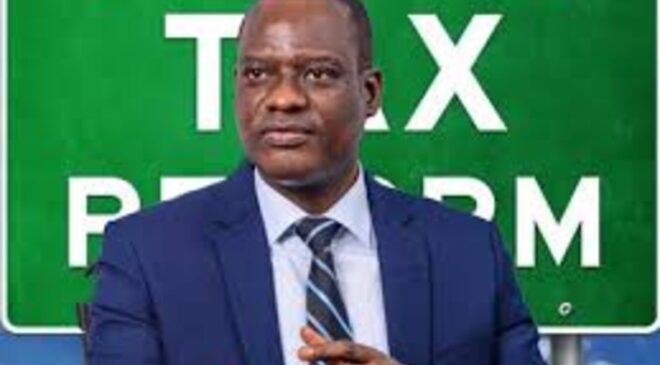
By Emmanuel Enebeli
LAGOS/Nigeria: Nigeria’s economy, which recently faced one of its gravest fiscal threats in decades, is now on a path toward stabilization and sustainable growth following bold reforms in taxation and fiscal policy. Taiwo Oyedele, Chairman of the Presidential Fiscal Policy and Tax Reforms Committee, outlined the rationale behind the sweeping changes at an interactive session for top journalists, public analysts, and influencers held at the Lagos Marriott Hotel. The session was also streamed live via the Committee’s YouTube channel.
Speaking to stakeholders, Oyedele highlighted that in the years leading to May 2023, Nigeria’s fiscal trajectory was unsustainable. The government had relied heavily on Ways and Means advances from the Central Bank, effectively printing money to fund expenditures. Collapsing oil revenues and stagnant tax collections compounded the problem, creating a scenario where trillions of Naira were injected into the economy, risking hyperinflation and currency devaluation.
He explained that the Nigerian National Petroleum Company (NNPC), expected to remit funds to the Federation Account, diverted earnings to subsidize Premium Motor Spirit (PMS), even pledging future oil production as collateral to fund current fuel consumption. Analysts warned that without decisive intervention, Nigerians could have faced a situation where holding ₦10,000 would not suffice to purchase fuel.
“The country was on the brink,” Oyedele said. “Perpetual money printing and subsidy payments were unsustainable. A decisive policy shift was unavoidable.”
The reforms that followed included ending fuel subsidies, unifying exchange rates, and halting Ways and Means financing. Two years on, early indicators point to macroeconomic stabilization: Nigeria now records a positive trade balance, NNPC remittances have resumed, and the tax-to-GDP ratio has improved from below 10 percent to 13.5 percent. While inflationary pressures persist, economic fundamentals are stabilizing, laying the groundwork for long-term growth.
At the core of these changes is the recognition that Nigeria’s old tax system had become a barrier to growth. For decades, outdated laws inherited from colonial administrators burdened citizens and businesses alike. Ambiguities, multiplicity of taxes, and overreach into low-income earners’ earnings stifled enterprise and discouraged investment. Reformers argued that incremental fixes would not suffice — a comprehensive overhaul was essential.
The new tax laws, effective January 2026, are designed to protect low-income earners while encouraging business growth. Minimum wage earners remain fully exempt, while most Nigerians earning up to ₦100,000 monthly will pay no tax. Thresholds for small business exemptions have been raised, with company income tax now zero for businesses generating less than ₦100 million annually. Corporate tax rates have been reduced from 30 percent to 25 percent to incentivize formalization, while capital gains taxation has been aligned with income levels, sparing small investors and protecting ordinary citizens’ assets.
“The reforms are not about punishing poverty,” Oyedele said. “They are about taxing prosperity, fostering growth, and encouraging compliance.”
He also stated that, beyond rates, the reforms address fiscal discipline and expenditure management. A National Fiscal Policy Framework aims to ensure government revenue is spent efficiently, prioritizing essential sectors and reducing waste. Multiple taxation at sub-national levels, including levies on wheelbarrows, bicycles, and radios, is under review, with some changes requiring constitutional amendments. Oyedele summarized the guiding principle succinctly: “Stop taxing seeds; wait for the fruits.”
Practical guidance for citizens and businesses was also emphasized. Taxpayers are encouraged to maintain proper records, use digital transfers instead of cash, retain receipts, and file returns on time. Businesses and individuals who leverage the new system stand to benefit from compliance incentives. “Better days are ahead, grounded in data,” Oyedele said. “But you must seek knowledge, read beyond headlines, and take action.”
He further stated that the reforms is further aimed at resetting the economy for households. Excise taxes on airtime and data, carbon levies on single-use plastics, and import duties on essential goods have been suspended. Previously high-cost levies that hindered investment have been removed, allowing disposable incomes to rise and household purchasing power to improve. The digital economy has also been opened, enabling millions of Nigerian youths to engage in remote work earning $1,000–$2,000 monthly, strengthening domestic consumption and bolstering the Naira.
The Chairman, said experts has emphasized that these reforms are just the foundation of a long-term strategy. Nigeria cannot rely solely on oil revenues or unsustainable borrowing. A fair, efficient tax system must underpin economic growth, ensuring those who earn more contribute their fair share while low-income earners remain protected. Compliance and trust are critical, as citizens must see tangible benefits from the taxes collected, including improved education, healthcare, infrastructure, and social protection.
The session highlighted opportunities for journalists, analysts, and businesses to become informed participants in Nigeria’s economic transformation. Oyedele urged attendees to read the new laws directly or via credible summaries, noting that mastery of the reforms can position individuals as authoritative voices in their sectors.
While acknowledging that the reforms are not perfect and that “unfinished business” remains, Oyedele stressed the importance of informed, constructive feedback. “Disagree if you must, but do so informed,” he said. “Together, we can move this country forward.”
The overarching message is clear: Nigeria’s new tax reforms aim to reduce inequality, protect vulnerable citizens, foster enterprise, and create a system where taxation drives prosperity rather than poverty. For businesses, workers, and households, the next few years represent an opportunity to participate in a fairer, more predictable, and growth-oriented economy.
